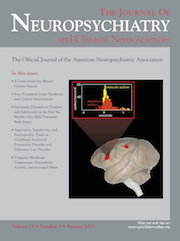To the Editor: The prevalence of catatonia among psychiatric patients ranges from 7.6% to 38%.
1 The concurrent or underlying diagnoses in these catatonic patients can be affective disorder, schizophrenia, schizoaffective disorder, a range of medical/neurological illnesses, and benzodiazepines withdrawal. The most common signs are mutism, posturing, negativism, staring, rigidity, echolalia, and echopraxia. Benzodiazepine and electroconvulsive therapy have been the first-line treatments for almost all types of catatonia.
2 This case is interesting as it established the utility of short course of lorazepam in a chronic case of catatonia without further recurrence of the condition.
Case Report
A 49-year-old, married man from a rural background presented with complaints of not speaking and maintaining posture for the past 17 years. He had a past history of a psychotic episode 1 year earlier, characterized by fearfulness, suspiciousness, aggressive outbursts, tendency to run away, and disturbed biological functions. He had received treatment for 3 months, and was manageable at home. After discontinuation of medications, he remained asymptomatic for about 6 months. Thereafter, he gradually stopped talking, was often seen staring for a long time while standing, was not working, remained aloof most of the time, and did not respond adequately to the events in his surroundings. On a few occasions, he was seen following his wife when she went out for some work. Over the next 2–3 years, he followed a simple routine (e.g., taking food at scheduled times) and would maintain his personal hygiene. He was admitted to our hospital and, in view of presence of chronic catatonic symptoms, was given 4 mg of lorazepam injection slowly by intravenous route. After 10–15 minutes, he became tearful and responsive. It was an emotional moment for the accompanying family members, as he responded after 17 years. Full diagnostic work-up, including biochemical investigations, urinalysis, electroencephalography, and computed tomography of brain did not reveal any abnormalities. He was administered injectable lorazepam 8 mg/day for an initial 3 days and, subsequently, tablets from the 4th day, which was tapered and stopped over the next 12 days. During serial mental status examinations, delusion of infidelity was elicited, and tablet olanzapine 15 mg/day was also started, on the 10th day of hospitalization. He was discharged in asymptomatic state after 45 days on tablet olanzapine 15 mg/day. Subsequently, over a follow-up period of 1 year, in which he was examined on three occasions, there was no emergence of catatonic symptom or any other psychotic symptoms, while he remained on regular dosage of olanzapine 15 mg/day.
Discussion
Lorazepam is the most commonly used benzodiazepine in the treatment of catatonia, but other benzodiazepines such as diazepam, oxazepam, and clonazepam have also been reported to be effective in catatonia.
3 Existing literature suggests that benzodiazepines are effective in acutely-emerging catatonia and their effectiveness is limited by chronicity of symptoms.
4,5 Emerging data also emphasized the need for long-term benzodiazepine maintenance therapy for chronic catatonic states.
6–8 In contrast, our patient with catatonia of 17 years’ duration showed a fast response to lorazepam, with complete resolution of all catatonic signs. He was maintained thereafter on olanzapine only, without long-term requirement of benzodiazepines. This case study highlights the possibility of complete resolution of longstanding catatonia with a brief course of lorazepam.

